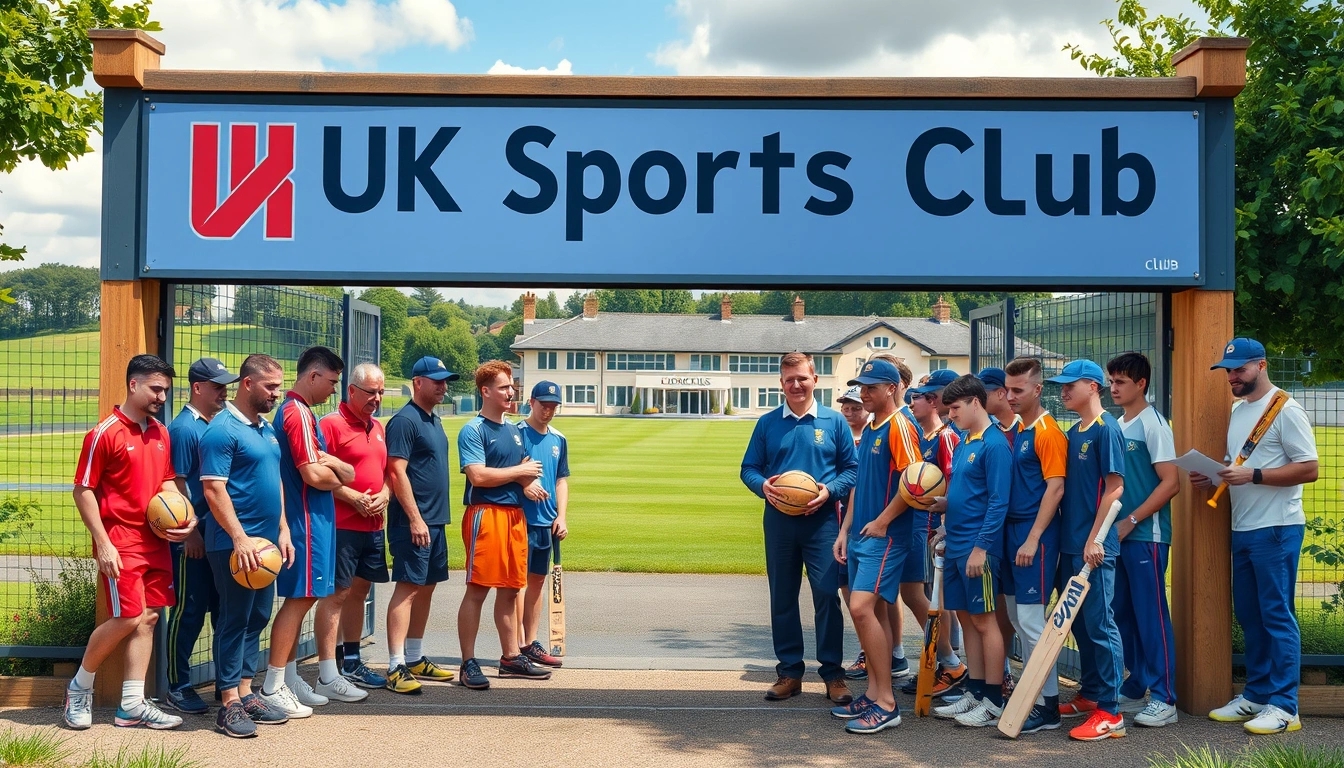Stepping into the world of UK sports clubs can feel a bit like wandering into a secret society where everyone knows the handshake except you. But fear not! Here’s a down-to-earth guide to how these clubs tick and, more importantly, how you can jump in without losing your marbles.
The Structure of UK Sports Clubs
At first glance, a sports club might look like just a bunch of folks chasing balls or swinging bats, but there’s a lot more going on behind the scenes. Most clubs are run by a committee—think of them as the club’s brain and brawn, juggling everything from finances to fixtures. Then you have the coaches, who actually get you off the couch and onto the pitch, usually volunteering their time because, well, passion over paychecks.
| Role | Responsibilities |
|---|---|
| Committee | Managing club affairs, organizing events, handling money |
| Coaches | Training players, planning sessions, game strategy |
| Volunteers | Supporting match days, maintenance, social events |
Membership Types and Fees
Joining a club isn’t just about turning up and saying “I’m in.” There’s usually a maze of membership categories: full, junior, social, and sometimes even “weekend warrior” options. Fees can range from pocket-money friendly to eyebrow-raising sums, depending on the club’s prestige and facilities.
What do you get for your money? Access to training, use of facilities, and sometimes a cheeky discount at the club bar (but don’t bank on a free pint every week). It’s worth asking what’s included upfront because hidden costs can sneak up on you.
- Full Membership: Access to all teams and facilities
- Social Membership: For those who prefer watching over playing
- Junior Membership: For kids and teens under specific age limits
Finding the Right Club for You
Not every club is your cup of tea. Some are ultra-competitive, others laid-back social hubs. The trick? Visit a few, chat with members, and maybe crash a training session or two. Websites and social media pages can give you a glimpse, but nothing beats the real vibe.
Also, consider your skill level—no point joining a top-tier rugby club if you’ve never tackled anyone outside a friendly pillow fight!
Volunteer Spirit & Community
These clubs survive on the goodwill of volunteers—folks who run the bar, fix the pitch, or organize the Christmas do. Without them, most clubs would fold faster than you can say “offside.” Getting involved beyond playing can be surprisingly rewarding and helps you feel part of something bigger.
Training & Commitment
Expect to show up regularly if you want to keep your spot, but most clubs understand life happens. Miss too many sessions without a heads-up, and you might find yourself warming the bench or worse, the sidelines. Balance is key—clubs want you to enjoy the game, not dread it.
| Commitment Level | Typical Training Frequency | Club Expectation |
|---|---|---|
| Casual | 1-2 times per week | Flexible attendance |
| Competitive | 3-5 times per week | Regular attendance required |
| Elite | Daily or near-daily | High commitment, strict attendance |
In short, UK sports clubs are bustling microcosms of passion, community, and sometimes chaos. Dive in with an open mind, a bit of patience, and maybe a pair of decent trainers, and you’ll find a place that’s more than just a club—it’s a second home.
The structure of UK sports clubs</h2
The structure of UK sports clubs
If you’ve ever thought a sports club in the UK is just a bunch of folks kicking balls or swinging bats, well, you’re in for a surprise. There’s a whole ecosystem buzzing behind the scenes—committees, coaches, volunteers, and a dash of chaos—that keeps the wheels turning. It’s not just about playing; it’s about organisation, community, and sometimes, a little bit of drama. Let’s unravel this tangled web, shall we?
First off, most UK sports clubs aren’t run by some mysterious overlord but by a committee. Think of them as the club’s brain and backbone, usually made up of volunteers who juggle roles like Chairperson, Treasurer, Secretary, and Welfare Officer. These people are the unsung heroes, often balancing full-time jobs alongside managing club affairs. Without them, the club would probably fall apart faster than a dodgy goalpost.
| Committee Role | Main Responsibilities |
|---|---|
| Chairperson | Leads meetings, makes executive decisions, represents club externally |
| Treasurer | Handles finances, budgets, and fee collection |
| Secretary | Manages correspondence, meeting minutes, and member records |
| Welfare Officer | Ensures safety, child protection, and member wellbeing |
Now, onto the coaches. These folks are the club’s heartbeat, the ones who actually make sure you don’t just run around like a headless chicken. Coaches range from volunteers with a passion for the sport to fully qualified professionals with badges and certifications. Depending on the club’s size and budget, you might get weekly training sessions or just a casual weekend kickabout. Either way, they’re the ones who’ll shout at you when you mess up your technique or forget your kit.
- Head Coach: Oversees training programs and team strategy.
- Assistant Coach: Supports the head coach and focuses on individual skills.
- Youth Coach: Works specifically with juniors and beginners.
But hold your horses, it’s not just about the people in charge. The club’s structure also includes sub-committees or working groups focusing on things like fundraising, social events, or grounds maintenance. Yes, someone’s got to mow the pitch, and it’s often a thankless task.
Why does all this matter? Because understanding the setup helps you figure out where you fit in. Are you happy being a casual player, or do you want to get involved in the committee? Fancy coaching or just turning up for a pint after the game? The structure defines the culture and vibe of the club.
Typical UK Sports Club Structure:- Committee - Chairperson - Treasurer - Secretary - Welfare Officer- Coaches - Head Coach - Assistant Coach - Youth Coach- Volunteers & Sub-committees - Fundraising - Social Events - Groundskeeping
So, next time you think about joining a UK sports club, remember: it’s not just about the sport. It’s a mini-society with roles, responsibilities, and yes, sometimes a bit of bickering over who forgot to order the new balls. But that’s what makes it all the more interesting—and rewarding.
Membership types and fees</h2
Membership types and fees
Joining a UK sports club? Well, buckle up, because the membership options and fee structures can sometimes feel like decoding ancient runes. It’s not just a simple “pay and play” situation—there’s a whole labyrinth of choices, and what you get for your money isn’t always straightforward (sorry to burst your bubble, but that free pint? Not guaranteed). Let’s dive into this confusing, often frustrating, but ultimately rewarding part of club life.
First off, memberships usually come in a few flavors. You’ve got your full membership, which typically grants access to all training sessions, competitions, and social events. Then there’s the social membership—perfect for those who want to be part of the community without sweating it out on the pitch every weekend. Some clubs also offer junior memberships for younger players, and family packages if you’re dragging the whole crew along. Confusing? Absolutely.
| Membership Type | Typical Annual Fee | What’s Included |
|---|---|---|
| Full Membership | £150 – £300 | Training, matches, voting rights, social events |
| Social Membership | £30 – £80 | Access to clubhouse, social events only |
| Junior Membership | £50 – £120 | Training, junior competitions |
| Family Membership | £250 – £500 | Combination of above for multiple family members |
Now, about those fees—clubs aren’t exactly shy about charging for everything under the sun. Aside from the basic membership fee, you might find yourself shelling out for competition levies, facility maintenance, kit fees, and sometimes even a “welcome pack” that’s less about swag and more about padding the club’s coffers. It’s worth checking the small print because some clubs sneak in extra costs that’ll make your wallet wince.
- Pro tip: Don’t assume your membership covers everything. Ask upfront what’s included and what’s extra.
- Warning: Some clubs expect you to volunteer or help with fundraising as part of your membership “fee” in sweat equity.
- Heads up: Payment plans vary—some clubs want the full amount upfront, others let you pay in installments.
What do you actually get for your money? Well, aside from the obvious access to training and matches, many clubs throw in social events, discounted coaching sessions, and sometimes even exclusive merchandise offers. But don’t expect a free pint every time you show up—those are usually reserved for special occasions or earned through volunteering. And if you’re hoping for fancy facilities, it really depends on the club’s size and funding. Some have top-notch gyms and lounges, others are more “bring your own folding chair.”
In short, joining a UK sports club means navigating a patchwork of membership types and fees that can seem like a minefield. But if you do your homework, ask the right questions, and maybe keep a spreadsheet handy, you’ll find a club that fits your budget and your sporting ambitions. And hey, even if the free pint is a myth, the friendships and fun usually make up for it.
How to find the right club for you</h2
How to find the right club for you
Alright, so you’ve decided to jump into the world of UK sports clubs — great choice! But hold on a sec, before you just sign up for the first club that pops up on Google, let’s talk about how to actually sniff out the perfect fit. Finding a club that matches your skill level, personality, and maybe even your social life (if you’re lucky) isn’t always straightforward. It’s a bit like dating, honestly — you want someone who challenges you, but also doesn’t make you want to run for the hills after the first session.
First things first: know your skill level. Are you a complete newbie who’s only ever kicked a ball in the garden? Or are you someone who’s played semi-seriously for years? Clubs usually cater to different abilities, so don’t be shy about asking where you’d slot in. Many clubs have beginner-friendly teams or casual sessions, so don’t panic if you’re rusty. On the flip side, if you’re a bit of a pro, joining a club that’s too “laid back” might bore you silly.
- Tip 1: Visit the club’s website or social media pages. Look for info about training sessions, teams, and player testimonials.
- Tip 2: Drop by for a trial or open day. Most clubs welcome newbies to come and have a go before committing.
- Tip 3: Chat with current members. They’ll give you the lowdown on the vibe — is it all hardcore competition, or more about social fun?
| Factor | What to Consider | Why It Matters |
|---|---|---|
| Skill Level | Beginner, intermediate, advanced | Ensures you’re not out of your depth or bored stiff |
| Club Culture | Competitive vs social, age groups, inclusivity | Helps you fit in and enjoy the experience |
| Location & Schedule | Travel time, training days/times | Practicality influences commitment and consistency |
| Membership Fees | Cost of joining, what’s included | Budget-friendly options prevent regrets |
Now, about personality — this is where things get interesting. Some clubs are ultra-serious, where everyone’s got their game face on 24/7. Others are more chilled, with a focus on having a laugh and maybe a pint after training. Be honest with yourself: do you want to be pushed to your limits, or do you want to keep it light and social? Neither is wrong, but mixing the two can lead to frustration.
And hey, don’t underestimate the power of social life. If you’re hoping to make friends or network through your club, look for teams that organise socials, charity events, or even the odd tournament trip. It’s all part of the package and can make a huge difference to your overall experience.
Practical checklist before joining:- Can you attend training regularly without it clashing with work/life?- Does the club have a trial period or pay-as-you-go sessions?- Are you comfortable with the coaching style and club rules?- What’s the average age and vibe of the members?- Does the club support your long-term goals (fitness, competition, fun)?
Remember, no club is perfect. You might have to try a few before you find “the one.” And that’s okay! The key is to keep an open mind, ask questions, and don’t be afraid to walk away if it’s not working out. After all, sports clubs should add to your life, not stress you out.
So, get out there, give it a go, and who knows? You might just find your new favourite team — and maybe even a second family.
Good luck, and may the best club win your heart!
The role of volunteers and community spirit</h2
The role of volunteers and community spirit
You know, when you stroll into a local UK sports club, it’s easy to get caught up in the thrill of the game — the goals, the tries, the smashing serves. But behind every match, every training session, and every pint shared in the clubhouse, there’s a hidden army quietly keeping the whole show on the road: the volunteers. These folks don’t get the glory or the headlines, but without them, most clubs would be up the creek without a paddle.
Volunteers are the lifeblood of community clubs. They’re the ones juggling roles like committee members, coaches, groundskeepers, and sometimes even the emergency tea makers (and trust me, that’s a vital role). Imagine trying to organise fixtures, maintain equipment, or keep the pitch playable without a team of unpaid enthusiasts pitching in. It’s a logistical nightmare waiting to happen. They literally keep the wheels turning, and often, they do it while juggling full-time jobs, family life, and whatever else gets thrown their way.
| Volunteer Role | Typical Duties | Why It Matters |
|---|---|---|
| Committee Member | Decision-making, budgeting, event planning | Ensures club runs smoothly and stays financially afloat |
| Coach/Trainer | Running sessions, mentoring players, skill development | Improves player performance and club success |
| Groundskeeper | Pitch maintenance, equipment care | Provides safe, playable facilities |
| Social Organiser | Arranging events, fundraisers, socials | Builds camaraderie and keeps spirits high |
Now, don’t get me wrong — volunteering isn’t all sunshine and roses. Sometimes it’s a thankless grind, and volunteers can get burnt out or fed up with the politics that occasionally bubble up in club committees. But here’s the kicker: the community spirit that volunteers foster is what makes or breaks your experience at a club. If the vibe is welcoming, inclusive, and just a bit cheeky, you’ll find yourself coming back week after week, not just for the sport but for the mates and memories.
- Positive community vibes: Feel like you belong, get involved, and enjoy the banter.
- Toxic environment: Cliques, drama, and gatekeeping — quick way to kill the fun.
- Volunteer burnout: When the same few do all the work, it can cause friction and drop in club morale.
Honestly, the best clubs are the ones where volunteers are appreciated, and newcomers are encouraged to chip in. It’s a two-way street: you help keep the club ticking, and the club gives you a sense of belonging and purpose beyond just playing the game. So next time you’re tempted to just turn up and disappear, think about lending a hand — even if it’s just putting out cones or helping organise a quiz night. Trust me, it makes a difference.
In a nutshell, volunteers are the unsung heroes — the backbone of every local sports club. Without their passion and grit, many clubs would struggle to survive. And the community spirit they nurture? That’s the secret sauce that turns a simple sports club into a second home.
Training schedules and commitment levels</h2
Training schedules and commitment levels
Joining a UK sports club means getting ready to juggle your calendar a bit — because these clubs have expectations, and they’re not shy about it. Now, don’t get me wrong, it’s not like you’re signing up for boot camp, but there’s definitely a rhythm to how often you’re expected to show up. Most clubs usually run training sessions two to three times a week, often in the evenings when folks have wrapped up their day jobs. Weekends? That’s usually reserved for matches or competitions, so be prepared to sacrifice some lazy lie-ins.
| Activity | Frequency | Time Commitment |
|---|---|---|
| Training Sessions | 2-3 times per week | 1.5 – 2 hours each |
| Match Days | 1 per week (weekends) | 3-5 hours |
| Social Events | Monthly | Varies |
Now, here’s the kicker: clubs vary wildly in how seriously they take this commitment. Some are all about having a laugh and just getting some exercise, while others are laser-focused on winning trophies and pushing your limits. So, it’s crucial to figure out what kind of vibe you’re after before you sign up. If you’re the “show up when I feel like it” type, some clubs might give you the cold shoulder, or worse, start whispering behind your back.
- Fun-first clubs: Emphasize enjoyment, socialising, and personal fitness. Training is flexible and laid-back.
- Competitive clubs: Expect regular attendance, punctuality, and a serious approach to improving skills.
- Mixed clubs: A bit of both worlds — friendly atmosphere but with some structured training.
So, what happens if you bail too often? Well, it’s not like you’ll be thrown out after missing a session or two, but reliability matters. Coaches and team captains rely on you turning up because it affects planning, team morale, and ultimately, performance. Miss too many sessions without a good reason, and you might find yourself warming the bench or, worse, being quietly dropped from the squad.
Pro tip: If life throws a curveball and you can’t make it, just be upfront and give a heads-up. Most clubs appreciate honesty and communication more than ghosting.
In the end, the key is balance. You want to commit enough to improve and be part of the team, but also keep it enjoyable so it doesn’t feel like a chore. After all, sports clubs are as much about community and fun as they are about the game itself. So, find your sweet spot, show up with a smile (even if you’re knackered), and you’ll fit right in.
Competitions and leagues explained</h2
Competitions and leagues explained
Navigating the tangled web of local leagues and regional competitions in the UK can feel like trying to find your way out of a hedge maze blindfolded. But fear not, once you get the hang of it, it’s actually pretty straightforward — and, dare I say, quite exciting. Your club isn’t just some isolated entity kicking a ball around a muddy pitch; it’s part of a much bigger sporting ecosystem that stretches from grassroots to the near-professional level.
First off, let’s break down the hierarchy of competitions. At the bottom, you’ve got your local leagues — these are the bread and butter for most community clubs. They’re usually organized by town or county associations and vary wildly in competitiveness. Some are casual Sunday kickabouts, others are fiercely competitive with promotion and relegation on the line. Above that, regional competitions bring together the best teams from multiple counties or districts, raising the stakes and the standard of play.
| Level | Typical Scope | Competition Type | Examples |
|---|---|---|---|
| Local Leagues | Town/County | Regular season matches with promotion/relegation | Manchester Sunday League, Surrey County Football League |
| Regional Competitions | Multiple counties/districts | Knockouts or league format with higher skill level | North West Counties Cup, South East Regional Cricket League |
| National Tournaments | Country-wide | Knockout cups, finals at major venues | FA Vase, National Amateur Football Cup |
Now, how does your club fit into this? Well, most clubs start in local leagues and, depending on their ambition, resources, and talent pool, they might aim to climb the ladder into regional competitions or even national tournaments. But don’t be fooled — moving up isn’t just about winning games; it involves meeting certain criteria like facilities, coaching qualifications, and financial stability. So, it’s not a free-for-all.
- Local leagues are perfect for beginners or those who want to keep it low key.
- Regional competitions suit clubs with some experience and a bit of bite.
- National tournaments are the dream for clubs with serious aspirations and a bit of luck.
It’s also worth mentioning that many sports have parallel league systems — for example, football and rugby have separate but similarly layered competitions. Your club might even participate in multiple leagues or cups simultaneously, depending on the sport and season.
A quick heads-up: the season schedules can be a bit of a nightmare to juggle, especially if your club’s involved in several competitions. Expect midweek fixtures, weekend double-headers, and the occasional “surprise” rescheduling. If you’re joining a club, be ready to embrace this chaos or risk being the one who’s always “sorry, can’t make it.”
Tips for surviving competitions and leagues:- Check the league’s website or social media for fixture updates regularly.- Know your club’s ambitions — are they in it for fun or promotion?- Don’t underestimate the importance of volunteer helpers on match days.- Be ready to travel — some regional matches can be a trek.
In the end, understanding where your club sits in the grand scheme of things helps set expectations and keeps you sane. It’s not just about showing up and playing; it’s about being part of a living, breathing community that thrives on competition, camaraderie, and the occasional post-match pint. So, lace up, dive in, and enjoy the rollercoaster that is UK sports leagues!
Equipment and kit requirements</h2
Equipment and Kit Requirements
Joining a UK sports club? Well, before you show up looking like you just rolled out of bed, it’s worth knowing what gear you’ll actually need. Sports clubs here vary wildly in their approach to equipment. Some are super generous, lending you essentials or even full kits, while others expect you to come fully armed, wallet at the ready. So, let’s break down what you might face and how to avoid looking like a total noob on day one.
First off, clubs and their gear policies can be all over the place. For instance, smaller community clubs often have a stash of basic equipment—balls, bats, nets, you name it—that newcomers can borrow. But don’t get too comfy thinking you’ll get the full kit handed over. Most clubs expect you to invest in personal items like boots, gloves, or protective gear, especially in sports like rugby, cricket, or hockey. It’s partly about hygiene, partly about fit, and partly about pride (because nobody wants to wear someone else’s stinky gloves).
| Sport | Typical Club Equipment Provided | What You Usually Need to Buy |
|---|---|---|
| Football (Soccer) | Balls, cones, bibs | Boots, shin pads, socks |
| Cricket | Balls, stumps, some bats | Batting gloves, pads, helmet |
| Rugby | Balls, cones | Boots, mouthguard |
| Tennis | Balls, nets | Racket, shoes |
Now, about avoiding the noob look—it’s not just about having the right gear but knowing how to wear it. Nothing screams “I’m new here” like mismatched kit or wearing last season’s flashy gear that’s totally out of place. A quick tip? Ask around or check the club’s website for any dress code or kit guidelines before splashing cash on the latest Nike drop. Sometimes, clubs have their own branded kit you’re expected to wear during matches or training, so it’s worth budgeting for that.
- Tip 1: Don’t buy everything new immediately. Start with basics and upgrade as you go.
- Tip 2: Second-hand gear markets and online forums can be lifesavers for affordable, decent kit.
- Tip 3: Pay attention to what the regulars wear—blend in rather than stand out.
Also, remember that some clubs might have seasonal kit requirements. For example, winter training might require extra layers or waterproofs, while summer sessions could be more relaxed. It’s not just about looking good but staying comfortable and safe. And yes, that means investing in a decent pair of trainers or boots that won’t leave you hobbling after the first session.
Common Gear Mistakes to Avoid:- Wearing brand new boots straight from the shop without breaking them in.- Forgetting to bring water bottles or personal towels.- Showing up in casual wear when the club expects full kit.- Ignoring weather-appropriate clothing.
In short, gear up smartly and don’t be shy to ask questions. Clubs want you to enjoy the sport, not freeze on the sidelines or trip over dodgy shoes. Whether they lend you a ball or expect you to bring your own bat, being prepared will save you embarrassment and maybe even a few quid. So, get your kit sorted and get ready to play like you belong—because, honestly, that’s half the battle won.
Social events and networking opportunities</h2
Social events and networking opportunities
Sports clubs in the UK aren’t just about lacing up your trainers and hitting the pitch or court. Nope, far from it. These clubs double up as vibrant social hubs where the real magic often happens off-field. You might think the fun ends when the whistle blows, but that’s just the surface. The social calendar at these clubs is usually packed with events that range from casual pub nights to full-blown charity fundraisers. And trust me, showing up to these can be just as important as turning up for training if you want to truly be part of the gang.
Why does this social side matter so much? Well, for starters, it’s where friendships are forged, team spirit is built, and networking happens naturally. Whether you’re a newbie or a seasoned player, these gatherings help break down barriers. It’s easier to bond over a pint or a BBQ than over a missed pass or a dropped catch, right? Plus, these events often have a relaxed vibe, so if you’re shy or just not that sporty, you can still feel included without the pressure of performing on the field.
| Common Social Events | Why They’re Popular |
|---|---|
| Post-match drinks | Casual, easy way to unwind and chat about the game (or anything else!) |
| Annual dinners or awards nights | Celebrate achievements and have a laugh with teammates and coaches |
| Charity fundraisers | Give back to the community while bonding over a good cause |
| Training camp socials | Intense training balanced with fun activities to build team morale |
Beyond just hanging out, these events are prime networking goldmines. You never know who you might meet — from local business owners to potential mentors or even future employers. Sports clubs often attract a diverse crowd, so it’s a unique chance to expand your social circle beyond your usual mates. And if you’re thinking, “Networking? Ugh, sounds stiff,” don’t worry. It’s usually pretty organic and way less formal than a business mixer.
- Tip 1: Don’t skip the socials just because you’re “not a social butterfly.” Even one event can open doors.
- Tip 2: Bring a friend along if you’re nervous—it makes everything less awkward.
- Tip 3: Volunteer to help organize an event. It’s a sneaky way to meet people and get noticed.
But heads-up: not every club nails the social side. Some can be cliquey or overly competitive, making the atmosphere a bit tense. It’s worth scouting out a few events before fully committing. A club that’s welcoming off the field usually means they’re a good bunch on it too.
In short, if you’re diving into the UK sports club world, don’t just think about the drills and matches. The social events and networking opportunities are where you’ll find the heart and soul of the club. Embrace the chaos, the laughter, and yes, even the awkward small talk — it’s all part of the experience that makes club life so much more than just a game.
How to apply and trial procedures</h2
How to apply and trial procedures
Joining a UK sports club might seem straightforward—just turn up, sign a form, and boom, you’re in, right? Well, not always. The process can be a bit of a maze, especially if you’re new to the scene or trying to avoid looking like a total rookie in front of the coach. So, here’s a down-to-earth guide on how to apply, what to expect at trials, and some handy tips to keep your dignity intact.
Step 1: Finding the club and making contact
First things first, you need to identify which club suits you. Most clubs have websites or social media pages where you can find contact details. Sometimes, it’s as simple as sending an email or filling out an online form. Other times, you might have to pop down to the club on a training night and speak to someone face-to-face. Don’t stress if you’re nervous—most clubs love enthusiastic newcomers.
Step 2: Application and membership forms
Once you’ve made contact, you’ll usually be sent an application form. This asks for your basic details, emergency contacts, and sometimes your playing experience. Some clubs also want you to agree to their code of conduct or health and safety rules. Yes, it’s a bit like signing a contract, but it’s all standard stuff.
| What to Expect on Application | Notes |
|---|---|
| Personal details | Name, age, contact info |
| Medical info | Any injuries or conditions |
| Previous experience | Optional but helpful |
| Agreement to club rules | Respect, attendance, safety |
Step 3: Trials – if the club runs them
Not all clubs hold trials, but if they do, don’t panic. Trials are basically a chance for coaches to see your skills and attitude in action. Expect to be put through some drills, maybe a small game, and definitely some fitness tests. It’s not a full-blown audition, so don’t sweat it too much.
- Tip: Arrive early, bring the right kit, and don’t forget water.
- Tip: Listen carefully to instructions—coaches appreciate players who pay attention.
- Tip: Try to relax and play your natural game; no one expects perfection.
How not to embarrass yourself in front of the coach
Right, here’s where most people worry. The truth? Coaches have seen everything—from absolute disasters to future stars. So, don’t be the person who turns up late, forgets their kit, or argues over a call. Keep it respectful and positive.
Common faux-pas to avoid:- Showing up late or unprepared- Complaining about drills or training intensity- Ignoring instructions or being distracted- Trying to show off unnecessarily
Remember, coaches want players who are coachable, enthusiastic, and reliable. If you mess up, it’s not the end of the world—just learn from it.
Summary checklist before your first session:
| Checklist | Status |
|---|---|
| Filled out application form | ✔️ |
| Checked trial date and time | ✔️ |
| Packed correct kit and water bottle | ✔️ |
| Arrived early | ✔️ |
| Positive attitude ready | ✔️ |
So, while the application and trial process might feel a bit daunting at first, it’s really just about showing up, being yourself, and demonstrating you’re ready to be part of the team. No need to stress over perfection—clubs are about growth, fun, and community as much as competition. Good luck out there!
Common pitfalls and how to avoid them</h2Common pitfalls and how to avoid them
So, you’ve decided to jump into the world of UK sports clubs—brilliant! But hold your horses before you dive headfirst into the chaos. Newbies often stumble into the same traps, turning what should be a fun, energizing experience into a frustrating mess. Let’s break down some of these typical slip-ups and how you can dodge them like a pro.
First up: commitment burnout. It’s all too easy to get swept up in the excitement and promise yourself you’ll be at every single training session, match, and social event. Reality check? Life happens. Work, family, Netflix binges—stuff gets in the way. Overcommitting can quickly lead to exhaustion and, worse, resentment. The trick? Be honest with yourself about how much time you can realistically give. Start small, get a feel for the rhythm, and build up gradually. Your future self will thank you.
| Typical Mistake | How to Avoid |
|---|---|
| Overcommitting to every event | Set realistic goals; prioritize key sessions |
| Ignoring club culture and social dynamics | Observe and engage gradually; ask questions |
| Not clarifying fees and membership details | Read the fine print; talk to existing members |
| Showing up unprepared or without proper kit | Check equipment lists; invest in basics early |
Speaking of club culture, don’t underestimate how much social dynamics matter. Walking into a new club like you own the place can backfire spectacularly. UK sports clubs often have their own quirky traditions, inside jokes, and hierarchies. Being respectful and patient goes a long way. Listen more than you talk at first, and don’t be shy about asking for help or advice. You’ll avoid misunderstandings and maybe even make a few mates.
Another classic blunder is misunderstanding the fee structure. Clubs can be a bit cryptic here—some charge a flat annual fee, others have monthly payments, and then there’s the occasional “hidden” kit or competition fees. Don’t just nod along at the signup desk; ask for a clear breakdown. Better yet, chat with current members to get the real scoop on what you’re expected to pay and when. No one wants surprise bills after a few months.
- Tip: Keep a simple spreadsheet or note of all payments due and deadlines.
- Tip: Watch out for non-refundable fees if you decide to quit mid-season.
And let’s not forget the dreaded drama. Yes, even in sports clubs. Whether it’s disagreements over team selection, personality clashes, or off-field gossip, some tension is inevitable. Your best defense? Stay professional, avoid gossip trenches, and focus on what brought you there: the sport. If things get too heated, speak to a coach or committee member rather than stew in silence.
Finally, a word on trial procedures and expectations. Many newbies mess up by either underperforming due to nerves or overpromising and underdelivering later. Be realistic about your skill level, prepare as best you can, and remember that clubs want you to succeed (well, mostly). If you don’t make the cut immediately, don’t sweat it—persistence and a good attitude can open doors later on.
Summary Checklist for Newbies:- Manage your time, don’t overcommit- Learn the club’s social vibe before diving in- Clarify all fees upfront- Gear up properly to avoid embarrassment- Stay clear of drama, keep communication open- Approach trials with honesty and preparation
In short, joining a UK sports club is a fantastic way to boost your fitness, meet new people, and have a blast. Just don’t rush it or expect perfection right out the gate. Avoid these common pitfalls, and you’ll be on track for a rewarding, drama-free experience.
Benefits beyond the sport</h2
Benefits beyond the sport
Joining a UK sports club isn’t just about lacing up your trainers and chasing a ball around the pitch. Nope, it’s way more than that. Sure, you’ll get fitter — probably sweat buckets and maybe even learn a new skill or two — but the perks go far beyond the obvious. In fact, being part of a club can sneakily transform your social life, mental health, and even your career prospects. Sounds too good to be true? Stick with me.
First off, the fitness gains are undeniable. Regular training sessions, matches, and even social runs or swims mean you’re moving more than your average sofa potato. But don’t expect to become an Olympian overnight — it’s about steady progress, feeling better in your own skin, and maybe dropping a few pounds without the soul-crushing boredom of solo gym sessions.
| Perk | What it Means | Why it Matters |
|---|---|---|
| Fitness | Improved health, stamina, and strength | Better energy levels, fewer sick days |
| Friendships | New mates who share your interests | Boosts happiness, reduces loneliness |
| Career Boosts | Networking, teamwork skills, leadership | Looks great on your CV, opens doors |
Now, let’s talk friendships. Joining a club is like joining a mini-community. You’ll find yourself chatting before and after practice, bonding over wins and losses, and maybe sharing a pint or two at the clubhouse. For many, these clubs become a second family, a place where social awkwardness melts away because you’ve got at least one thing in common — a love for the sport. And honestly, these friendships can be lifesavers when life gets a bit rubbish.
But wait, there’s more — career-wise, sports clubs can be surprisingly handy. You might think, “How on earth does playing netball help me get a job?” Well, think again. Clubs teach teamwork, leadership, discipline, and time management — all the buzzwords recruiters drool over. Plus, you’ll meet people from all walks of life, some of whom might just be the key to your next job opportunity. Not bad for kicking a ball about, right?
- Networking opportunities: Casual chats at club socials can lead to professional connections.
- Skill development: Managing team dynamics or captaining a side hones leadership.
- Confidence building: Regular participation boosts self-esteem — handy in interviews!
And here’s a little secret: the mental health benefits are massive. Getting out, being active, and feeling part of something bigger can seriously help with stress, anxiety, or just the daily grind. Plus, those endorphins after a good workout aren’t just a myth — they really do make you feel on top of the world.
Summary of Unexpected Benefits:- Improved physical health without the gym monotony- Genuine friendships that extend beyond the pitch- Valuable skills for your CV and personal growth- Mental health boost through social connection and exercise
So, next time you’re dithering about whether to join that local football or cricket club, remember: it’s not just about the game. It’s about the life-changing perks lurking just beneath the surface. You might come for the sport but stay for the friendships, the laughs, and who knows — maybe even a career boost or two.
Future trends in UK sports clubs</h2
Future trends in UK sports clubs
Peering into the crystal ball of UK sports clubs, it’s clear the game is changing — and fast. The old image of muddy pitches, a scruffy bunch of blokes in mismatched kits, and a weekly pint at the local pub is evolving into something far more tech-savvy, inclusive, and socially aware. But don’t get me wrong, that post-match pint isn’t going anywhere just yet. What’s shifting, though, is how clubs operate behind the scenes and how they’re adapting to new societal rhythms.
First off, technology is no longer just a fancy addition; it’s becoming the backbone of club life. From apps that handle everything from booking training slots to tracking player stats, to virtual coaching sessions that keep you sharp even if you’re stuck at home, tech is making joining and staying in a club easier than ever. Clubs are also experimenting with wearables and data analytics — yes, your heart rate and sprint speed might soon be scrutinised more than your actual skills!
| Tech Innovations | Impact on Clubs |
|---|---|
| Mobile Booking Apps | Simplify training & match sign-ups |
| Wearable Devices | Improve player performance & injury prevention |
| Virtual Coaching | Access to expert advice anytime, anywhere |
| Online Communities | Boost social interaction & support networks |
But it’s not just about gadgets. Inclusivity is becoming a huge focus. Sports clubs are opening their doors wider than ever to people of all genders, ages, abilities, and backgrounds. This isn’t just PR fluff — clubs are actively developing programs for disabled athletes, creating women’s teams where none existed, and fostering environments where everyone feels welcome. It’s a refreshing shift from the “boys’ club” vibe that some of us remember all too well.
- Adaptive sports programs for those with disabilities
- Mixed-gender teams gaining popularity
- Community outreach to underrepresented groups
- Flexible membership options to suit diverse lifestyles
Social habits are also reshaping club culture. With more people juggling hectic schedules and a growing emphasis on mental health, clubs are becoming less about rigid training and more about flexible participation and social connection. Casual sessions, wellness workshops, and mental health support are now part of the package. The old “show up or ship out” mentality is slowly fading, replaced by a more understanding and supportive approach.
Future Club Life Snapshot:- Tech-driven bookings & training- Inclusive, welcoming environments- Flexible commitment & wellness focus- Stronger community & social engagement
So, what does this all mean for the next decade? Expect UK sports clubs to be more connected, more diverse, and more adaptable. They’ll be places where tech and tradition collide, where everyone from the weekend warrior to the aspiring pro can find their place. And yeah, you’ll probably still get that pint after the match — but now with an app reminding you when it’s time to hydrate and stretch!
In short, the future’s looking bright, a bit messy, and definitely more inclusive. Sports clubs aren’t just surviving — they’re evolving, and that’s something to get excited about.
Frequently Asked Questions (The title must be written in English.)
- What is the typical structure of a UK sports club?
UK sports clubs usually run like a well-oiled machine, with a committee handling the admin and coaches focusing on training. It’s not just about the sport; there’s a whole team behind the scenes making sure everything runs smoothly, from organizing events to managing finances.
- How do membership fees work, and what do they cover?
Membership fees can vary widely, but they generally cover access to training sessions, use of facilities, and sometimes kit or equipment. Don’t expect a free pint every time though! It’s worth checking exactly what’s included so you know where your money’s going.
- How can I find the right sports club for me?
Think about your skill level, what kind of vibe you want, and how much time you can commit. Visiting clubs, chatting to members, or trying out a session can help you sniff out the perfect fit that suits both your athletic goals and social needs.
- Why are volunteers so important in sports clubs?
Volunteers are the backbone of many clubs, keeping things ticking behind the scenes. From organizing events to maintaining equipment, their passion fuels the community spirit that makes clubs more than just a place to play.
- What kind of commitment do training schedules require?
Training frequency varies, but most clubs expect regular attendance to keep up with the team. Missing too many sessions can affect your spot, so it’s a balance between fun and dedication. Just like anything worthwhile, consistency is key!
- How do competitions and leagues work within UK sports clubs?
Clubs often enter local and regional leagues, giving members a chance to compete and improve. Think of it as leveling up in your sport, with different tiers and tournaments that match your skill and ambition.
- Do I need to buy my own equipment and kit?
It depends on the club and the sport. Some clubs provide basics, but usually, you’ll need to invest in personal gear to avoid looking like a total noob. It’s a good idea to ask upfront to budget accordingly.
- Are social events part of the club experience?
Absolutely! Sports clubs double as social hubs where you can meet new people and build friendships off the field. From BBQs to quiz nights, these events add a fun layer to your club life and help strengthen team bonds.
- What should I expect during the application and trial process?
Applying usually involves filling out forms and sometimes attending trials where coaches assess your skills. Don’t stress—just be yourself, show enthusiasm, and remember everyone was a newbie once.
- What are some common pitfalls for new members, and how can I avoid them?
Newbies often bite off more than they can chew or misunderstand club culture. Staying honest about your availability, communicating openly, and asking questions can help you dodge drama and enjoy your time.
- What benefits do I get beyond just playing the sport?
Joining a sports club isn’t just about fitness; it’s a gateway to making friends, boosting mental health, and even enhancing career skills like teamwork and leadership. It’s like signing up for a full-on life upgrade.
- How are UK sports clubs evolving for the future?
Clubs are embracing technology, pushing for inclusivity, and adapting to changing social habits. This means more online engagement, diverse membership options, and flexible training to fit modern lifestyles—making clubs more accessible than ever.













